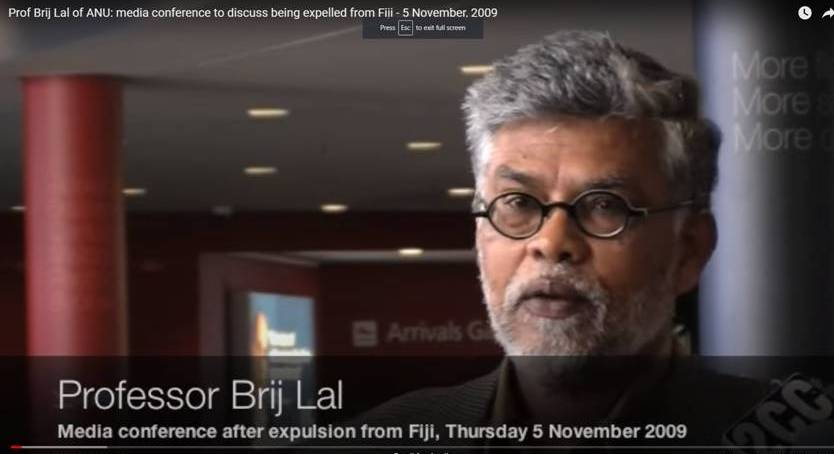 Professor Brij Lal holds a media conference on Thursday 5 November 2009, upon returning to Canberra after being expelled from Fiji. [source: ANU TV YouTube]
Professor Brij Lal holds a media conference on Thursday 5 November 2009, upon returning to Canberra after being expelled from Fiji. [source: ANU TV YouTube]
[This is an excerpt from an article in The Round Table: The Commonwealth Journal of International Affairs.]
Brij V. Lal didn’t quite reach his three score and ten. He died peacefully at his home in Brisbane on 25 December 2021, age 69, from complications related to pulmonary fibrosis. A few days later his very last journal article was published in The Round Table. There is an irony of timing. At what turned out to be the end of a great career, Brij sat back and did a masterful reflective overview of Fiji’s political evolution, writing with insight and feeling about the land of his birth.
The son of illiterate sugar cane tenant farmers, Brij was the quintessential scholarship boy, going to the University of the South Pacific. He was always a high flier. Demonstrating ‘a capacity for academic achievement’, as he called it, he then wrote his MA thesis in Canada, where he married his soul mate Padma, an accomplished environmental scientist and herself a high flier. Next it was a scholarship to the Australian National University for doctoral studies. With the publication of his PhD thesis as Girmitiyas: the origins of the Fiji Indians (1983), Brij had ‘arrived’. This young man’s book has carried its years gracefully and is still hailed by seasoned scholars.
Brij continued to publish widely on Indo-Fijian indenture and, later, the Indian diaspora generally, but these concerns were overtaken by a consuming passion for the political history of Fiji and more particularly with decolonisation and more recent political developments in that country. This redirection was given impetus by the first coup in 1987, resulting in an astounding corpus of high-quality publications from Brij – including political biographies of the Indian leaders A.D. Patel and Jai Ram Reddy – that will become part of the record itself. Brij’s stature within Fiji was such that he was appointed one of the three Constitution Review Commissioners (CRC) in 1996, and in the early 2000s he was the obvious choice to edit the volume on Fiji for the British Documents on the End of Empire project.
The features of Brij’s writings on Fiji politics were consistency and a strong moral stance involving adherence to liberal democratic principles, an abhorrence of the country’s coup culture and insistence that the verdict of the ballot box be respected. His position on issues was never in doubt and he never deviated from his principles. But disappointment piled upon disappointment at repeated transgressions from these ideals. They provided him with endless copy for one book and journal article after another and were, in a sense, the ‘making’ of Brij Lal. But it was, as he said, ‘so painful to visit the past, a failed past at that’. A particular disappointment was the abrogation of the 1997 Constitution, the one he had helped to create, in 2009. By that time Fiji had experienced four coups.
Speaking truth to power has its hazards and in 2009 the regime in Fiji banned Brij from the country, followed by Padma the next year, on the spurious grounds that they were a threat to national security. It was a blow beneath the belt as they had bought a house in Suva in which they intended to spend their retirement. When retirement came, they moved to Queensland and Brij spent much of his remaining years in his downstairs study (‘the dungeon’). Despite increasing blindness and general health worries, that same driven quality continued. Brij kept on writing about indenture and Fiji politics, always saying that his current piece of writing would be his last and telling close friends to hold him to his promise to never write another thing on Fiji. We knew better than to try and he was in the saddle right to the end.
Professor Doug Munro is with the University of Queensland, Brisbane, Australia.
Related articles:
Fiji: troubled journey of a beleaguered nation – The last major article written by Brij Lal appeared in the December 2021 edition of the Round Table Journal.
Professor Brij Lal of ANU College of Asia and the Pacific media conference on Thursday 5 November 2009, upon returning to Canberra after being expelled from Fiji – The Australian National University (ANU) TV.



